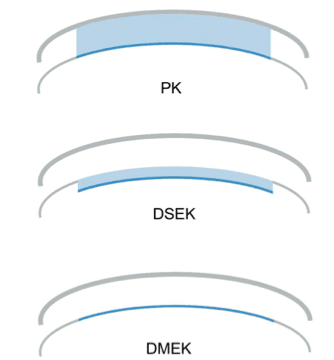The cornea is the transparent dome-like structure at the front of the eye. It helps to protect the eye and also helps it to focus light for clear vision. It consists of several layers of specialized cells and tissue. When the innermost layer, which is called the endothelium, is affected by a condition or disease, such as Fuchs’ dystrophy, the cornea can become cloudy and swollen and obscure vision. To restore vision, surgery may be required.
Until recently, treating a disorder of the endothelium required a full-thickness corneal transplant. In a full-thickness transplant, a button-shaped section of the central cornea that consists of all the corneal tissue layers, even those that are not damaged, is removed and replaced with donor tissue from an eye bank. Now, less invasive transplant methods have been developed and refined. One such method, known as endothelial keratoplasty, has become the procedure of choice for treating patients who have a poorly functioning corneal endothelium.

DSAEK and DMEK can be repeated if necessary, and if one does not provide the desired results, the other can be performed in an effort to attain better vision. Dr. Fintelmann is available in our Phoenix, Sun City and Mesa locations to consult with patients about these advanced procedures. Call (866) 742-6581 for more information.

